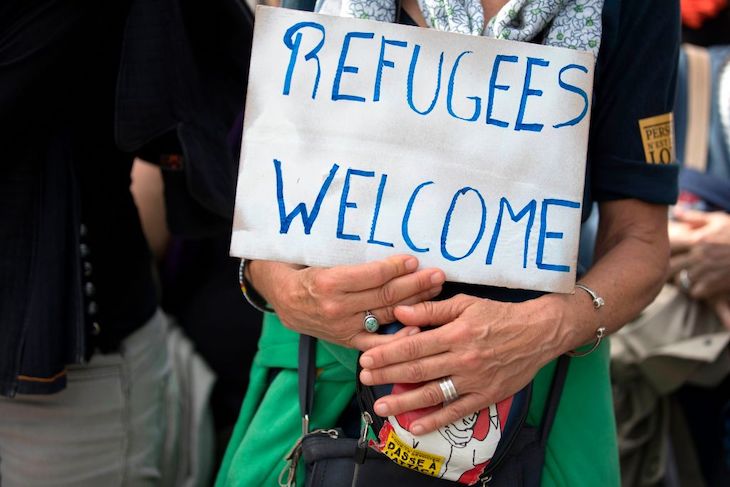Refugees could contribute £266,000 each to the UK economy: that’s the claim made by Together with Refugees and the Public and Commercial Services Union (PCS) in a report published today, which says ‘fair and humane changes to the asylum system’ could benefit Britain. Unfortunately, something isn’t quite adding up. Spectator Verify has investigated, and we’ve found that not only is the £266,000 figure highly dubious, but that it’s reasonable to believe the policies proposed could have a significant net cost to the economy.
The report makes no secret of the fact its proposals are extremely expensive
Welcoming growth: the economic case for a fair and humane asylum system proposes four measures, three of which could be ruinously expensive. These include cutting asylum-claim processing times to six months; legal assistance at all stages of the application (to ‘improve success rates’); English-language support; and employment support in Britain from day one.
Given the number of asylum seekers already in Britain – and the pull factor of these initiatives to migrants considering coming to Britain – these plans could cost tens, if not hundreds, of millions.
The report makes no secret of the fact its proposals are extremely expensive. Buried in the numbers is an acknowledgment that, while they think each refugee accepted could earn the ‘overall economy’ £265,788, the net benefit could be as low as £53,000 to the public purse over 12.5 years from their arrival.
LSE researchers who carried out the analysis have used an ‘individual-level simulation Markov model’ for the report to come up with their numbers. They’ve built their model on some absurd assumptions.
First, they assume that refugees will secure employment 18 months after being granted asylum. While there is currently not much data on this, a Home Office study of over 100,000 asylum seekers found that just 12 per cent of adults who arrived via refugee resettlement schemes were in employment as of 2021. There is no reason to believe that with a few small changes to the system this pattern would be completely disrupted.
They’ve also assumed that refugees will obtain adequate English language for employment after classes are provided. In 2017, an Oxford language study found that 84 per cent of refugees said they did not have sufficient English language ability to get a job. Unfortunately, there is absolutely no research showing that the provision of more hours of English as a Second Language (ESOL) classes could fix this for 100 per cent of migrants.
Around 90 per cent of refugees aged 16 and over participating in the Vulnerable Persons resettlement schemes already attend some form of English as a Second Language teaching provision during their first six months in the UK. But after a year, only a third of the participating group managed to progress by a single ESOL level. The most common barrier to attendance was physical or mental health issues – not availability of provision.
Then let’s look at contributions. For refugees to add £265,788 to the economy and £53,000 to the public purse, not only would they need to be in employment, but they’d also need to be high (or at the very least average) earners. Home Office research so far has shown that refugees who are in employment (a minority) tend to take on lower paid work. According to a recent Home Office Study, just 5.1 per cent of employed refugees from the resettlement schemes were in professional occupations, rising to 8.7 per cent for those from asylum routes. Some 54 per cent of Resettled Refugees are in social housing).
Research from the Centre for Policy Studies has found that the average migrant who gains Indefinite Leave to Remain (as LSE researchers assume refugees will do) is a net cost to the British taxpayer over their lifetime. There is no reason why a refugee would earn more than the average migrant – particularly given their likely lower starting standard of English and the fact they were not recruited on a work visa – so it makes sense to assume they will earn at best the same, and most likely less.
In the year ending June 2025, 51,997 people were granted asylum. Under the policies proposed in this paper (day one employment support and a higher chance of a successful claim incentivising people to make the dangerous journey) this number would no doubt go up, potentially costing the taxpayer billions.
The report promises policy makers a magic wand: improved mental health support, access to the legal system and a right to work, and claims without justification that this would radically alter the immigration system (housing costs are predicted to fall by £42,000 per person and mental health costs are expected to drop from £75 per month to £17 per person.) There is simply no reason to believe these numbers to be accurate.
It’s also worth noting that the paper quietly slips in: ‘PCS is a member of Together with Refugees, the largest pro-refugee campaign coalition in British history. It is the largest trade union in the civil service, with many of its members working within the asylum system for the Home Office.’ This doesn’t spell well for that all important Civil Service Impartiality.








Comments